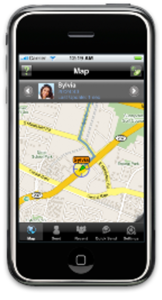A Redmond-based startup is introducing a location-based social sharing service called Glympse. With a mobile application that works on iPhone, Android and Windows Mobile devices, users share their location (aka a “Glympse”), allowing their friends to see that location on another phone or on any other Internet-connected device. Senders can customize who gets to see the Glympse they post, whether the recipient is just one person, a group, or even everyone they’ve added as a friend on a social network like Facebook or Twitter.

The interesting twist to this service isn’t the location-sharing aspect, of course – there are dozens of companies that allow for that today – it’s the service’s real-time nature and the thoughtfully included privacy features. Using a patent-pending timer option, Glympse users specify how long their location is visible to which select group of friends, with a maximum time of four hours before the location data expires.
Location is Not a Game, It’s a Utility
Unlike the current crop of location-based social networking services (think Brightkite, Loopt, Gowalla, Foursquare, etc.), Glympse isn’t designed to find nearby friends, share tips about local businesses or collect rewards for check-ins. It employs no game mechanics to encourage participation – that is, you aren’t given badges or points the more you use it. You don’t get to become the “mayor” of a place by checking in there the most, like you do in Foursquare. In fact, Glympse can hardly be called a “mobile social network” at all.

Glympse is more like a utility, and that may what ensures its success long after everyone tires of “checking in” just because they can.
There are a number of scenarios where Glympse may prove useful. Their PR team says they’ve seen its earliest users sharing locations related to cross-country road trips, marathons, paragliding flights and afternoons of skiing.
Although those standout occasions may give Glympse a “wow” factor, it’s in answering the everyday “where are you?” type questions where Glympse could prove be the most useful.
In the “What is Glympse?” introductory video, the company says sending a Glympse is easier than making a call or sending a text. That’s not necessarily true, though. Calls and texts are sent with the push of a button where Glympse requires a multi-step process that begins with installing the application on your mobile device, if supported.
But as mentioned later in the video, many states have banned texting or making phone calls while driving. That’s where Glympse comes in. Before you leave work, school or your home, you could send out a Glympse. For the time you specify, those permitted to see your location can track where you are at any given moment in real-time courtesy of your phone’s GPS capabilities.
Live Updating Maps and Privacy Features
That’s right – Glympse doesn’t “check you in,” it tracks you. Much like those pricey “family locator” cell phone add-on plans do, but for free.
The service also addresses the privacy issues surrounding location-sharing, even going so far as to work with a safety group called ConnectSafely.org when designing the service. In Glympse, adding friends isn’t an “all or nothing” endeavor. That is, you don’t choose whether to just accept or reject friends. You accept friends, then group them accordingly (“family,” “friends,” “work,” etc.). Later, when you’re ready to share your location, you choose which group or groups should see it. Only want the spouse and kids to tune in? Share a Glympse with family. At a large conference where you want to meet up with colleagues? Send a Glympse to your “work” group. And so on.
Facebook Integration: A Plus, Not the Selling the Point
Much of the news coverage related to Glympse’s launch has to do with its Facebook integration. That’s an interesting option to be sure, especially since Facebook plans to announce their own location-sharing service later this month, according to reports.

But whether or not Facebook users actually care to see the locations of their friends is another matter entirely. Many Facebook users simply use the network to catch up with friends and family they don’t get to see every day by posting on their wall, chatting via Facebook’s IM service and by browsing their shared photos, videos and links. Whether or not a friend is on their way to a meeting right nowmay be completely irrelevant information to these users. Like the intrusions from other apps and games, Glympse’s Facebook updates – which come via a large, embedded map placed in the News Feed – could very well end up being hidden from view by Facebook users who simply aren’t interested in seeing that sort of data.
In other words, it’s arguable that Glympse’s Facebook (and Twitter) sharing features aren’t necessarily the key selling points of its service. Real-time live data, the utility aspect of the tool itself and its built-in privacy features, however, are. Hopefully, mainstream users will understand that before mistakenly dismissing it as just another Facebook app clogging up their News Feed with noise.










